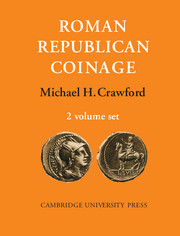Book contents
- Frontmatter
- Contents
- VOLUME I
- INTRODUCTION
- CATALOGUE
- VOLUME II
- misc-frontmatter
- 1 Technique and Technology
- 2 Weight Standards
- 3 Monetary Magistrates
- 4 Special Formulae
- 5 Administration and Control
- 6 Roman Units of Reckoning Under the Republic
- 7 Coinage and Finance
- 8 Careers of the Moneyers
- 9 Types and Legends
- 10 Art and Coinage
- Plates
- Indices
- Plate section
1 - Technique and Technology
from VOLUME II
Published online by Cambridge University Press: 07 October 2011
- Frontmatter
- Contents
- VOLUME I
- INTRODUCTION
- CATALOGUE
- VOLUME II
- misc-frontmatter
- 1 Technique and Technology
- 2 Weight Standards
- 3 Monetary Magistrates
- 4 Special Formulae
- 5 Administration and Control
- 6 Roman Units of Reckoning Under the Republic
- 7 Coinage and Finance
- 8 Careers of the Moneyers
- 9 Types and Legends
- 10 Art and Coinage
- Plates
- Indices
- Plate section
Summary
The coinages of the ancient world, including that of the Roman Republic, are remarkable in that they were, unlike most other artefacts, mass-produced. I do not wish here to discuss the larger problems raised by the level of Greek and Roman technology, but it seems desirable to describe as fully and accurately as possible the techniques used by the Republican mint.
METAL
The Republic coined at one time or another in gold, silver and a variety of copper alloys; the metals are best considered in this order.
Analyses of Republican gold have only once, as far as I know, been attempted; both they and specific gravity measurements suggest that a very high degree of purity was maintained.
The same was on the whole true of silver. The Republican treasury knew how to test for purity of silver (Livy xxxii, 2, 1-2), and the analyses in Table XLV reveal deliberate debasement only during the Second Punic War (6-8), during the fighting between Marius and the Sullans (26-7) and in the coinage of M. Antonius, notably in the Legionary series (49-62). The debasement of the Second Punic War is reported by Zonaras (viii, 26, 14, under the year 217, but not explicitly dated), that of M. Antonius is probably mentioned by Pliny (NH xxxiii, 132, miscuit denario triumvir Antonius ferrum, Antonius as Triumvir mixed iron into his denarii, where ferrum must be an error for aes, since silver and iron are virtually immiscible; there is no reason to suppose that the passage refers to plating on iron, see p. 560 n. 1). The analytical evidence for the debasement of the coinage of L. Rubrius Dossenus is corroborated by the frequent occurrence in hoards which I have seen of denarii of Dossenus covered with verdigris. Pliny's ascription of a plan to debase the silver coinage to M. Livius Drusus, Tr. PI. 91 (see p. 616), may preserve a garbled reminiscence of the debasement of the coinage by Dossenus in 87; but Pliny's confusions can rarely be resolved with any certainty.
I take it that all serious debasement of the precious metal coinage of the Roman Republic was the result of financial stringency. It is apparent that after the debasement of the Second Punic War the quality of the silver coinage was restored to as high a level as could be expected in the ancient world.
- Type
- Chapter
- Information
- Roman Republican Coinage , pp. 569 - 589Publisher: Cambridge University PressPrint publication year: 1975
- 1
- Cited by



